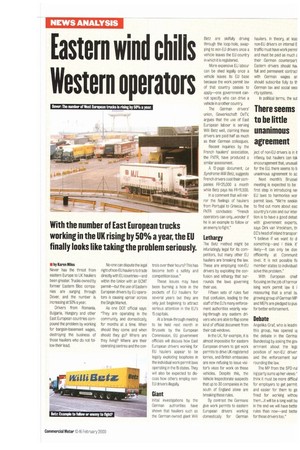Eastern wind chills western operators
Page 13

If you've noticed an error in this article please click here to report it so we can fix it.
Docer The number it West Empean trudcs Is Meg by 50% a year.
With the number of East European trucks working in the UK rising by 50% a year, the EU finally looks like taking the problem seriously.
U by Karen Miles
Never has the threat from eastern Europe to UK hauliers been greater. Trucks owned by former Eastern Bloc companies are surging through Dover, and the number is increasing at 50% a year.
Drivers from Romania, Bulgaria, Hungary and other East European countries compound the problem by working for bargain-basement wages, destroying the business of those hauliers who do not follow their lead. No-one can oispute the legal right of non-EU healers to trade directly with EU countries—and within the Union with an ECMT permit—but the use of Eastern European drivers by EU operators is causing uproar across the Single Market.
As one DOT official says: They are operating in the community, and domestically, for months at a time. When should they come and when should they go? Where are they living? Where are their operating centres and the con trols over their hours? This has become both a safety and competition issue."
These issues may have been burning a hole in the pockets of EU hauliers for several years but they are only just beginning to attract serious attention in the EU's 15 capitals.
At a break-through meeting to be held next month in Brussels by the European Commission, EU government officials will discuss how East European drivers working for EU hauliers appear to be legally exploiting loopholes in the individual work permit laws operating in the 15 states. They will also be expected to discuss how others employ nonEU drivers illegally.
Giant
Initial investigations by the German authorities have shown that hauliers such as the German-owned giant Will Betz are skilfully driving through the loop-hole, swapping to non-EU drivers once a vehicle leaves the EU country in which it is registered.
More expensive Eli labour can be shed legally once a vehicle leaves its EU base because the work permit law of that country ceases to apply—one government cannot specify who can drive a vehicle in another country.
The German drivers' union, Gewerkschaft argues that the use of East European labour is serving Willi Betz well, claiming these drivers are paid half as much as their German colleagues Recent inquiries by the French hauliers' association, the FNTR, have produced a similar assessment.
A 12-page document, to Syndrome Willi Betz suggests French drivers cost their companies FFr25,000 a month while Betz pays his FFr11,500.
In a comment that will mirror the feelings of hauliers from Portugal to Greece, the FNTR concludes: "French operators can only...wonder if he is an example to follow or an enemy to fight."
Lethargy
The Betz method might be infuriatingly legal for its competitors, but many other EU hauliers are breaking the law. These are employing non-EU drivers by exploiting the confusion and lethargy that surrounds the laws governing their use.
Fifteen sets of rules fuel that confusion, leading to the staff of the EU's many enforcement authorities wearily waving-through any eastern drivers who are able to flap some kind of official document from their cab windows.
In the UK, for example, it is almost impossible for eastern European drivers to get work permits to drive UK-registered lorries, and British embassies are now refusing to issue visitor's visas for work on these vehicles. Despite this, the Vehicle Inspectorate suspects that up to 30 companies in the south of England alone are breaking these rules.
By contrast the Germans give work permits to eastern European drivers working domestically for German hauliers. In theory, at leas non-EU drivers on internal E traffic must have work permh and must be paid as much E their German counterpart Eastern drivers should ha), full and permanent contraci with German wages an should subscribe fully to th German tax and social sect rity systems.
In political terms, the sui
There seems to be little unanimous agreement
ject of non-EU drivers is knit infancy but hauliers can tak encouragement that, unusual for the EU, there seems to b unanimous agreement to ac Next month's Brussel meeting is expected to be first step in introducing nei EU laws to harmonise war permit laws. "We're seekin to find out more about eac country's rules and our inter tion is to have a good debat with government experts, says Dirk van Vreckham, th EC's head of inland transpon "I believe if we want to d something—and I think it' likely—it can only be don efficiently at Communit level. It is not possible fo member states to individuall solve this problem."
With European chief focusing on the job of harmor ising work permit law it i reassuring that a small bL growing group of German MP and MEPs are pledged to pus for better enforcement.
Debate
Angelika Graf, who is leadin this group, has opened ul the debate in the Germa Bundestag by asking the gov ernment about the legs position of non-EU driver and the enforcement sur rounding the law.
The MP from the SPD nil ing party sums up her views:' think it must be more difficul for employers to get permit and easier for them to go fined for working witimu them...it will be a long wait bu in the end we will have bette rules than now—and bette for these drivers too."












































































































